美国劳动法
美国劳动法权益与义务
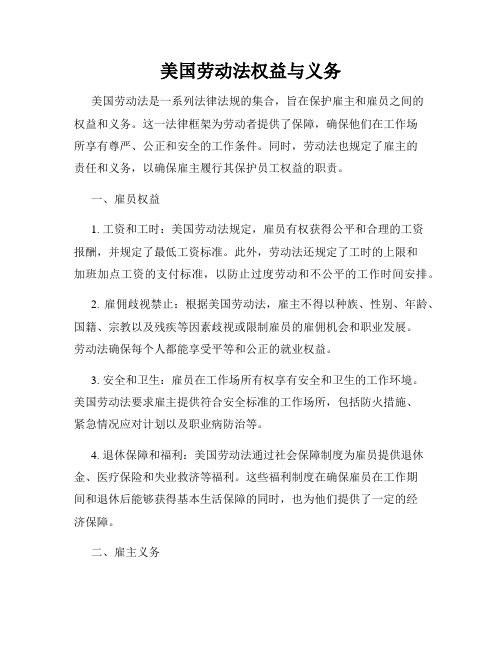
美国劳动法权益与义务美国劳动法是一系列法律法规的集合,旨在保护雇主和雇员之间的权益和义务。
这一法律框架为劳动者提供了保障,确保他们在工作场所享有尊严、公正和安全的工作条件。
同时,劳动法也规定了雇主的责任和义务,以确保雇主履行其保护员工权益的职责。
一、雇员权益1. 工资和工时:美国劳动法规定,雇员有权获得公平和合理的工资报酬,并规定了最低工资标准。
此外,劳动法还规定了工时的上限和加班加点工资的支付标准,以防止过度劳动和不公平的工作时间安排。
2. 雇佣歧视禁止:根据美国劳动法,雇主不得以种族、性别、年龄、国籍、宗教以及残疾等因素歧视或限制雇员的雇佣机会和职业发展。
劳动法确保每个人都能享受平等和公正的就业权益。
3. 安全和卫生:雇员在工作场所有权享有安全和卫生的工作环境。
美国劳动法要求雇主提供符合安全标准的工作场所,包括防火措施、紧急情况应对计划以及职业病防治等。
4. 退休保障和福利:美国劳动法通过社会保障制度为雇员提供退休金、医疗保险和失业救济等福利。
这些福利制度在确保雇员在工作期间和退休后能够获得基本生活保障的同时,也为他们提供了一定的经济保障。
二、雇主义务1. 遵守劳动法:作为雇主,必须严格遵守美国劳动法的各项规定。
雇主有责任了解并确保自己所从事的行业符合劳动法规定的标准,并采取合法合规的雇佣和管理措施。
2. 提供公平的就业机会:雇主应该避免任何雇佣歧视行为,确保所有求职者平等获得工作机会。
这意味着不能以人种、性别、年龄、国籍、宗教、残疾等因素歧视求职者。
3. 维护安全和卫生:雇主有责任为员工提供安全和健康的工作环境,包括提供必要的安全设施和培训,确保员工在工作过程中不会受到伤害。
4. 提供薪资福利:雇主必须按时支付员工工资,符合最低工资标准,并提供法律规定的福利待遇,如退休金计划、医疗保险等。
雇主还需要遵守加班工资支付规定,确保员工在超时工作时能够获得合理的加班报酬。
5. 遵守雇佣合同:雇主应与员工签订正式的雇佣合同,明确双方的权益和义务。
美国劳动关系法律规定(3篇)
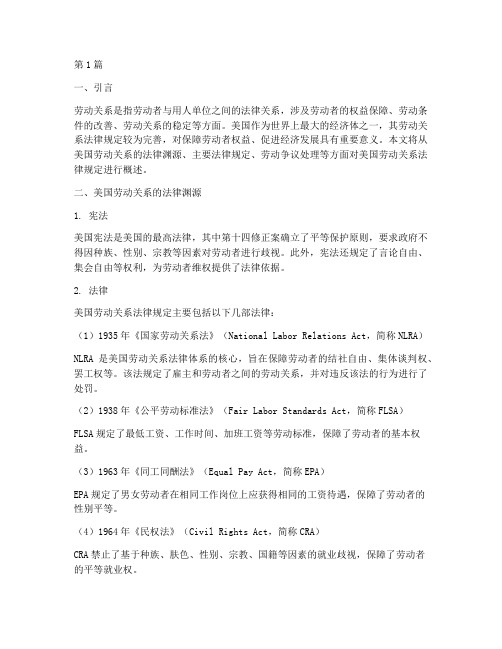
第1篇一、引言劳动关系是指劳动者与用人单位之间的法律关系,涉及劳动者的权益保障、劳动条件的改善、劳动关系的稳定等方面。
美国作为世界上最大的经济体之一,其劳动关系法律规定较为完善,对保障劳动者权益、促进经济发展具有重要意义。
本文将从美国劳动关系的法律渊源、主要法律规定、劳动争议处理等方面对美国劳动关系法律规定进行概述。
二、美国劳动关系的法律渊源1. 宪法美国宪法是美国的最高法律,其中第十四修正案确立了平等保护原则,要求政府不得因种族、性别、宗教等因素对劳动者进行歧视。
此外,宪法还规定了言论自由、集会自由等权利,为劳动者维权提供了法律依据。
2. 法律美国劳动关系法律规定主要包括以下几部法律:(1)1935年《国家劳动关系法》(National Labor Relations Act,简称NLRA)NLRA是美国劳动关系法律体系的核心,旨在保障劳动者的结社自由、集体谈判权、罢工权等。
该法规定了雇主和劳动者之间的劳动关系,并对违反该法的行为进行了处罚。
(2)1938年《公平劳动标准法》(Fair Labor Standards Act,简称FLSA)FLSA规定了最低工资、工作时间、加班工资等劳动标准,保障了劳动者的基本权益。
(3)1963年《同工同酬法》(Equal Pay Act,简称EPA)EPA规定了男女劳动者在相同工作岗位上应获得相同的工资待遇,保障了劳动者的性别平等。
(4)1964年《民权法》(Civil Rights Act,简称CRA)CRA禁止了基于种族、肤色、性别、宗教、国籍等因素的就业歧视,保障了劳动者的平等就业权。
3. 行政法美国劳动关系的法律渊源还包括一系列行政规章和行政命令,如美国劳工部(Department of Labor,简称DOL)制定的规章、总统行政命令等。
三、美国劳动关系的主要法律规定1. 结社自由和集体谈判权NLRA赋予了劳动者结社自由和集体谈判权。
劳动者有权自由组建、加入工会,通过工会与雇主进行集体谈判,争取更好的劳动条件。
加州劳工法

加州劳工法一、背景介绍加州劳工法是美国加利福尼亚州的劳动法律体系,旨在保护劳动者的权益,维护劳动关系的和谐与稳定。
加州作为美国人口最多的州之一,其劳工法对于整个美国劳动法体系具有重要的影响力。
本文将详细探讨加州劳工法的主要内容和相关案例,以及对劳动者和雇主的影响。
二、加州劳工法的主要内容加州劳工法包含了一系列法律法规,其中主要内容包括但不限于以下几个方面:1. 最低工资标准根据加州劳工法,雇主必须向员工支付不低于最低工资标准的薪酬。
当前加州的最低工资标准为每小时15美元(截至2021年),高于美国联邦最低工资标准。
此外,加州还设有特定行业的最低工资要求,例如餐饮业和农业等。
2. 加班工资加州劳工法规定,员工在超过每天8小时或每周40小时的工作时间后,应享受加班工资。
加班工资通常为正常工资的1.5倍或2倍,具体标准取决于工作时间和劳动合同的约定。
此外,加州劳工法还要求雇主为员工提供足够的休息时间,以确保员工的工作安全和健康。
3. 雇佣关系加州劳工法明确规定了雇主和员工之间的权益和责任。
雇主必须向员工提供安全、健康的工作环境,并遵守就业歧视和骚扰等方面的法律规定。
此外,加州劳工法还规定了员工的福利和权益,例如带薪病假、家庭病假、产假和丧假等。
4. 遣散和解雇加州劳工法对雇主进行了严格的限制,规定了解雇员工的条件和程序。
雇主必须遵守合理的解雇程序,并支付相应的遣散费用。
此外,加州劳工法还规定了员工在遣散或解雇后的权益保护措施,例如提供失业救济金和重新就业援助。
三、加州劳工法的影响加州劳工法的实施对劳动者和雇主都产生了重要的影响。
1. 对劳动者的影响加州劳工法的实施使得劳动者在工作中享有更多的权益和保护。
最低工资标准的提高保障了劳动者的基本生活水平,加班工资的支付保证了劳动者的劳动价值得到合理回报。
此外,加州劳工法对雇佣关系的规定使得劳动者在工作中更加安全、健康,不受歧视和骚扰的困扰。
2. 对雇主的影响加州劳工法对雇主的经营方式和成本产生了一定的影响。
美国保护劳工的法律规定(3篇)

第1篇一、引言美国作为世界最大的经济体之一,其劳工保护法律体系十分完善。
从19世纪末开始,美国陆续颁布了一系列旨在保护劳工权益的法律,这些法律涵盖了工资、工时、劳动条件、社会保障、职业安全与健康等多个方面。
本文将详细介绍美国保护劳工的法律规定,以期对读者有所帮助。
二、美国劳工保护法律体系概述美国劳工保护法律体系主要包括以下几个方面的法律规定:1. 工资和工时2. 劳动条件3. 职业安全与健康4. 社会保障5. 劳动争议和调解三、工资和工时1. 工资支付美国法律规定,雇主必须支付给雇员不低于最低工资标准的工资。
最低工资标准由联邦政府制定,各州也可以根据本州实际情况制定高于联邦标准的最低工资标准。
2. 工时制度美国实行标准工时制度,即每周工作40小时,超过40小时的工作时间视为加班。
加班工资不低于正常工资的1.5倍。
3. 薪资调查和审计美国劳动部负责对雇主支付工资情况进行调查和审计,以确保雇主遵守工资和工时方面的法律规定。
四、劳动条件1. 工作环境美国法律规定,雇主必须为雇员提供安全、卫生的工作环境。
这包括防止工伤、职业病的发生,以及保障劳动者的身体健康。
2. 劳动合同雇主与雇员之间的劳动合同必须符合法律规定,明确双方的权利和义务。
3. 工作时间美国法律规定,雇主不得强迫雇员在规定工作时间之外工作,除非双方达成协议。
五、职业安全与健康1. 职业安全与健康标准美国职业安全与健康局(OSHA)负责制定和实施职业安全与健康标准,以保障劳动者在工作中的安全与健康。
2. 职业病防治美国法律规定,雇主必须采取有效措施预防职业病的发生,并为劳动者提供必要的防护用品。
3. 工伤赔偿美国法律规定,雇主必须为劳动者购买工伤保险,以保障劳动者在工作中发生意外伤害时的权益。
六、社会保障1. 社会保险美国社会保障制度包括养老保险、医疗保险、失业保险等,旨在保障劳动者在退休、生病、失业等情况下获得基本的生活保障。
2. 工伤保险如前所述,美国法律规定,雇主必须为劳动者购买工伤保险,以保障劳动者在工作中发生意外伤害时的权益。
美国和中国现行的劳动法有何不同?
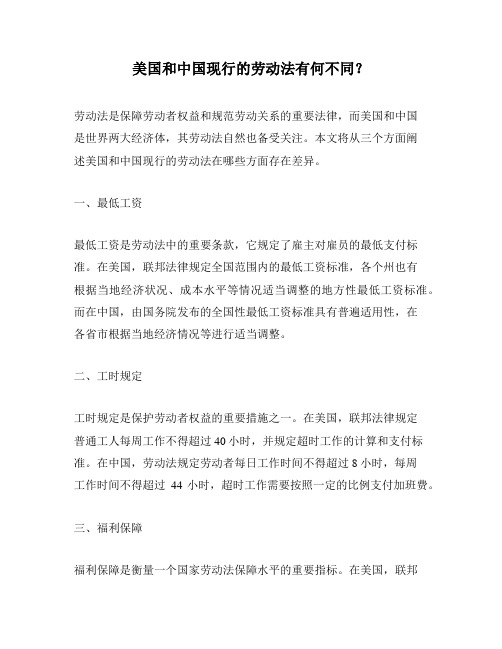
美国和中国现行的劳动法有何不同?劳动法是保障劳动者权益和规范劳动关系的重要法律,而美国和中国是世界两大经济体,其劳动法自然也备受关注。
本文将从三个方面阐述美国和中国现行的劳动法在哪些方面存在差异。
一、最低工资最低工资是劳动法中的重要条款,它规定了雇主对雇员的最低支付标准。
在美国,联邦法律规定全国范围内的最低工资标准,各个州也有根据当地经济状况、成本水平等情况适当调整的地方性最低工资标准。
而在中国,由国务院发布的全国性最低工资标准具有普遍适用性,在各省市根据当地经济情况等进行适当调整。
二、工时规定工时规定是保护劳动者权益的重要措施之一。
在美国,联邦法律规定普通工人每周工作不得超过40小时,并规定超时工作的计算和支付标准。
在中国,劳动法规定劳动者每日工作时间不得超过8小时,每周工作时间不得超过44小时,超时工作需要按照一定的比例支付加班费。
三、福利保障福利保障是衡量一个国家劳动法保障水平的重要指标。
在美国,联邦法律规定雇主必须提供医疗保险、失业保险、工伤保险等基本福利,而雇主提供其他福利如退休金、带薪假期等则是自愿性质。
在中国,劳动法规定雇主必须为其员工缴纳社会保险,包括养老保险、医疗保险、失业保险等,同时规定了带薪假期、工伤保障等其他福利保障措施。
总结:劳动法是保障劳动者权益和规范劳动关系的重要法律。
美国和中国现行的劳动法在最低工资、工时规定、福利保障等多个方面存在明显差异,这反映了两国在社会制度、经济体制等方面的不同。
今后,在国际经济交流互动中,双方都应该尊重对方的劳动法体系,提高劳动者的权益保障水平,促进共同发展。
美国法律规定_生产(3篇)

第1篇在资本主义国家中,美国以其庞大的经济体量和严格的法律体系而闻名。
在美国,生产活动受到众多法律法规的约束,这些法律旨在保护工人权益、维护市场秩序、促进环境保护以及确保产品质量。
以下将详细探讨美国在生产领域的主要法律规定。
一、劳动法1. 工作时间与休息美国劳动法对工作时间与休息时间有明确规定。
《公平劳动标准法》(Fair Labor Standards Act,简称FLSA)规定了以下内容:(1)每周工作时间不得超过40小时,超过部分需支付加班费。
(2)加班费支付标准为工资的1.5倍。
(3)每周休息日为周日。
2. 工资支付《公平劳动标准法》规定,雇主必须支付给员工不低于最低工资标准的工资。
目前,美国最低工资标准为每小时7.25美元。
此外,各州还可以设定高于联邦最低工资标准的州最低工资标准。
3. 工作条件与安全《职业安全和健康法》(Occupational Safety and Health Act,简称OSHA)要求雇主为员工提供安全的工作环境,防止职业伤害和职业病的发生。
OSHA规定了各种职业健康与安全标准,如化学品使用、机械操作、噪音控制等。
4. 工会组织与集体谈判美国劳动法保障员工有权组织工会,进行集体谈判。
这一权利体现在《国家劳动关系法》(National Labor Relations Act,简称NLRA)中。
二、环境保护法1. 清洁空气法《清洁空气法》(Clean Air Act)旨在减少大气污染,保障公众健康。
该法规定了各种污染物的排放标准,包括工业废气、汽车尾气等。
2. 清洁水法《清洁水法》(Clean Water Act)旨在保护水质,防止水污染。
该法规定了水体的排放标准,包括工业废水、生活污水等。
3. 资源保护与恢复法《资源保护与恢复法》(Resource Conservation and Recovery Act,简称RCRA)旨在管理固体废物,防止污染。
该法规定了固体废物的分类、处理、运输和填埋等要求。
美国劳动法关于休假制度
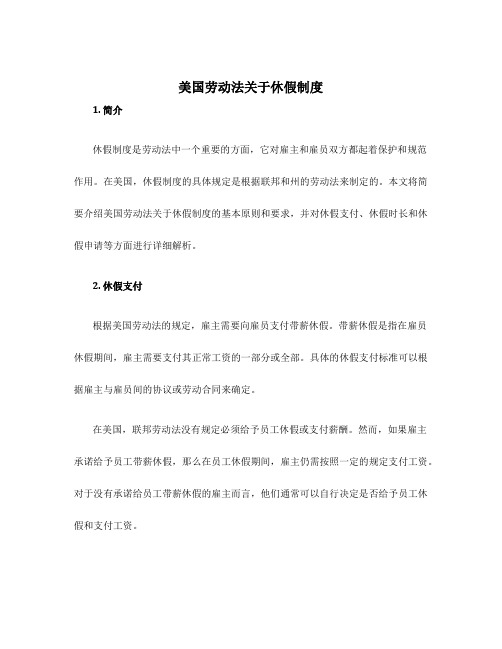
美国劳动法关于休假制度1. 简介休假制度是劳动法中一个重要的方面,它对雇主和雇员双方都起着保护和规范作用。
在美国,休假制度的具体规定是根据联邦和州的劳动法来制定的。
本文将简要介绍美国劳动法关于休假制度的基本原则和要求,并对休假支付、休假时长和休假申请等方面进行详细解析。
2. 休假支付根据美国劳动法的规定,雇主需要向雇员支付带薪休假。
带薪休假是指在雇员休假期间,雇主需要支付其正常工资的一部分或全部。
具体的休假支付标准可以根据雇主与雇员间的协议或劳动合同来确定。
在美国,联邦劳动法没有规定必须给予员工休假或支付薪酬。
然而,如果雇主承诺给予员工带薪休假,那么在员工休假期间,雇主仍需按照一定的规定支付工资。
对于没有承诺给员工带薪休假的雇主而言,他们通常可以自行决定是否给予员工休假和支付工资。
在一些州,针对雇员休假权利和休假支付问题,有特定的州劳动法规定。
例如,加利福尼亚州要求雇主在每年一定的工作时间里,向员工支付带薪休假薪酬。
此外,一些行业或特定类型的工作也可能有自己的休假支付标准。
3. 休假时长美国劳动法关于休假时长的规定较为灵活,没有设定统一的标准。
通常情况下,休假时长可以根据雇主政策、工作合同和工作年限等因素来确定。
在大部分美国州份,休假时长的设定是没有具体要求的。
这意味着,雇主可以根据自身情况灵活决定员工的休假时长。
然而,一些州有特定的规定,例如,纽约州规定,雇主应当给予全日制员工不少于一天的带薪休假。
需要注意的是,即便没有法定的休假时长要求,雇主也不能过分地限制或否定员工的休假权利。
这也是为保护员工健康和工作生活平衡所做的努力。
4. 休假申请在美国,雇员通常需要提前向雇主提出休假申请。
具体的申请程序和要求可以根据雇主政策来确定,也可以根据员工与雇主间的协议或劳动合同来规定。
在大部分情况下,雇员需要提前一定的时间向雇主提出休假申请,以便雇主安排工作和制定相关计划。
通常,休假申请会要求提供休假日期、休假时长和理由等信息。
美国劳动法保护工人权益的法律制度
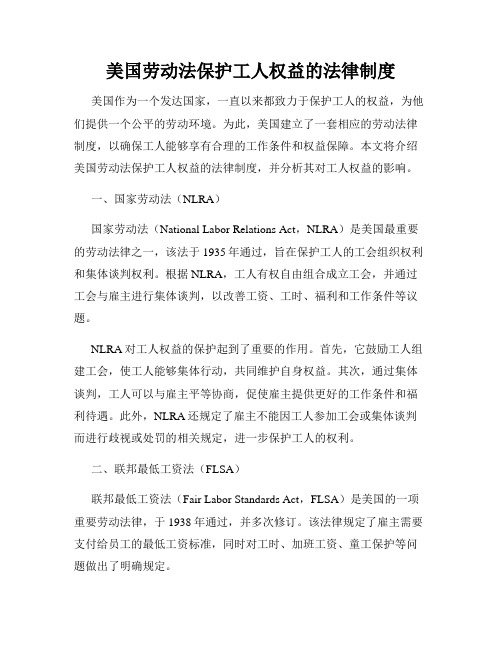
美国劳动法保护工人权益的法律制度美国作为一个发达国家,一直以来都致力于保护工人的权益,为他们提供一个公平的劳动环境。
为此,美国建立了一套相应的劳动法律制度,以确保工人能够享有合理的工作条件和权益保障。
本文将介绍美国劳动法保护工人权益的法律制度,并分析其对工人权益的影响。
一、国家劳动法(NLRA)国家劳动法(National Labor Relations Act,NLRA)是美国最重要的劳动法律之一,该法于1935年通过,旨在保护工人的工会组织权利和集体谈判权利。
根据NLRA,工人有权自由组合成立工会,并通过工会与雇主进行集体谈判,以改善工资、工时、福利和工作条件等议题。
NLRA对工人权益的保护起到了重要的作用。
首先,它鼓励工人组建工会,使工人能够集体行动,共同维护自身权益。
其次,通过集体谈判,工人可以与雇主平等协商,促使雇主提供更好的工作条件和福利待遇。
此外,NLRA还规定了雇主不能因工人参加工会或集体谈判而进行歧视或处罚的相关规定,进一步保护工人的权利。
二、联邦最低工资法(FLSA)联邦最低工资法(Fair Labor Standards Act,FLSA)是美国的一项重要劳动法律,于1938年通过,并多次修订。
该法律规定了雇主需要支付给员工的最低工资标准,同时对工时、加班工资、童工保护等问题做出了明确规定。
FLSA的实施对工人权益有着积极的影响。
首先,FLSA确保了工人能够获得合理的薪酬待遇,保障了工人的基本生活需求。
其次,FLSA规定工作时间和加班工资的标准,避免了工人过度加班的情况,并为超时工作提供了相应的补偿。
此外,FLSA还对童工保护做出了明确规定,保障了未成年工人的权益。
三、职业安全与健康法(OSH Act)职业安全与健康法(Occupational Safety and Health Act,OSH Act)于1970年通过,是美国管理和监管职业安全与健康的法律依据。
根据该法律,雇主有责任为员工提供一个安全和健康的工作环境,并制定相关的安全措施和规章制度。
美国劳动法的特点与适用
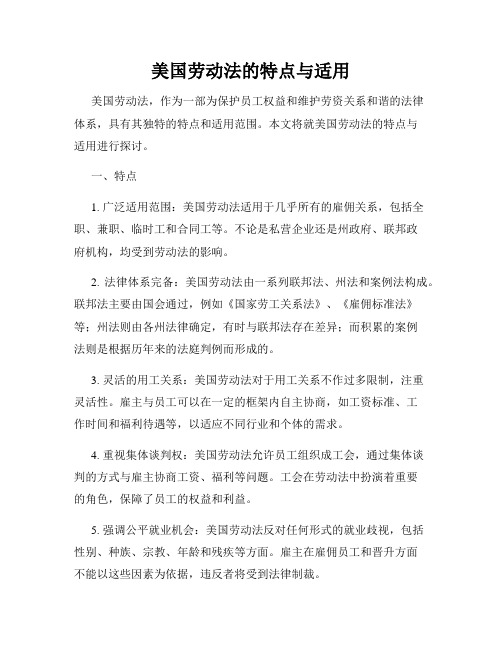
美国劳动法的特点与适用美国劳动法,作为一部为保护员工权益和维护劳资关系和谐的法律体系,具有其独特的特点和适用范围。
本文将就美国劳动法的特点与适用进行探讨。
一、特点1. 广泛适用范围:美国劳动法适用于几乎所有的雇佣关系,包括全职、兼职、临时工和合同工等。
不论是私营企业还是州政府、联邦政府机构,均受到劳动法的影响。
2. 法律体系完备:美国劳动法由一系列联邦法、州法和案例法构成。
联邦法主要由国会通过,例如《国家劳工关系法》、《雇佣标准法》等;州法则由各州法律确定,有时与联邦法存在差异;而积累的案例法则是根据历年来的法庭判例而形成的。
3. 灵活的用工关系:美国劳动法对于用工关系不作过多限制,注重灵活性。
雇主与员工可以在一定的框架内自主协商,如工资标准、工作时间和福利待遇等,以适应不同行业和个体的需求。
4. 重视集体谈判权:美国劳动法允许员工组织成工会,通过集体谈判的方式与雇主协商工资、福利等问题。
工会在劳动法中扮演着重要的角色,保障了员工的权益和利益。
5. 强调公平就业机会:美国劳动法反对任何形式的就业歧视,包括性别、种族、宗教、年龄和残疾等方面。
雇主在雇佣员工和晋升方面不能以这些因素为依据,违反者将受到法律制裁。
二、适用范围1. 雇佣关系:美国劳动法适用于全职、兼职、临时工、合同工和实习生等各类雇佣关系。
无论是有薪水的还是无薪水的,只要存在劳动关系,就受到劳动法保护。
2. 劳动合同:美国劳动法对劳动合同的订立和执行提供了明确的规定。
劳动合同包括雇佣协议、薪资结构、工作时长、福利待遇等条款,旨在确保雇主和员工之间的权益平衡和合法性。
3. 薪资和福利:美国劳动法规定了最低工资、加班工资、休假制度以及福利待遇等一系列薪资和福利标准。
雇主必须遵守这些规定,确保员工在工作中享受公平和合理的待遇。
4. 雇主责任与员工权益:美国劳动法规定了雇主的基本责任,包括提供安全的工作环境、遵守劳动法、不进行歧视以及支付合理的报酬等。
比较劳动法美国劳动法

• 考虑到上述情形,地区法院发现俱乐部对 原告工作过程的显著控制与对独立承包商 应有的程度明显不同我们认为,被告对舞 女的控制已经达到了用人单位对劳动者所 施加的控制程度如果不得出该结论,将过 分降低雇主管控因素,并将公平劳动标准 法设计要保护的工作人员排除在外
•
• 个别劳动关系:是指劳动者个人与用人单位 形成劳动关系。
雇佣劳动初期,最早产生于英国;
• 劳动的核心标准是control —— • 一旦某个主体的劳动是由别人告诉他做么,他自己
决定怎么做,那他就是一个独立劳动,一旦别人告 诉其做什么和怎么做,则这是一个从属性劳动。
• 随着时间的发展,这样的判断标准受到了挑战:企 业中,老板只告诉劳工做什么,而不告诉其怎么做 ,最典型的是研发型企业,雇员自己决定怎么做。 按照control的标准,这不归于任何一类,但事实双 方的确是劳动关系。
是指工会代表劳动者团体与用人单位或者用人单位团体之间形成的工资立法工资立法劳动保障立法劳动保障立法公平就业机会和肯定行为的规则公平就业机会和肯定行为的规则关于集体谈判的法规关于集体谈判的法规其他法律条款其他法律条款公平劳工标准州低工资资标准通行工资社会保障立法失业保险立法工伤补偿立法退休收入保障立法同工同酬法律和法规就业年龄歧视立法性骚扰立法特殊人物保护法案美国的劳动雇佣法律体系综合性法规综合性法规劳动合同和集体合同方面劳动合同和集体合同方面工资方面工资方面工时和劳动保护方面工时和劳动保护方面促进就业和职业培训方面促进就业和职业培训方面社会保障方面社会保障方面中国劳动法律体系内容中国劳动法律体系内容三中国的劳动法律体系典型立法fairlaborstandardsact简称flsa二国家劳动关系法thenationallaborrelationsact三1963年平等工资法案theequalpayactepa四1964年民权法案thecivilrightsact职业安全健康法theoccupationalsafetyhealthactwalshhealypubliccontractact六服务契约法案mcnamaraoharaservicecontractact七戴维斯佩根法案thedavisbaconact八科普兰法案thecopelandact九各州法律1935年颁布的劳动关系法是美国宪法的一部分成为调整美国劳动关系的一部基本法该法的核心是集体谈判它包括以下几个部分
美国带薪休假法律规定(3篇)
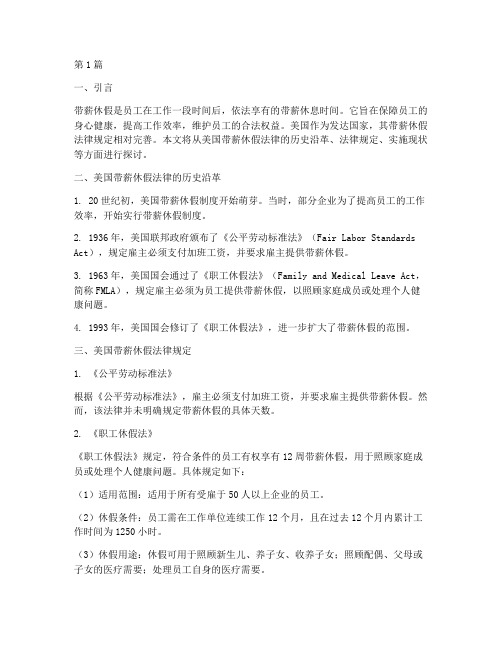
第1篇一、引言带薪休假是员工在工作一段时间后,依法享有的带薪休息时间。
它旨在保障员工的身心健康,提高工作效率,维护员工的合法权益。
美国作为发达国家,其带薪休假法律规定相对完善。
本文将从美国带薪休假法律的历史沿革、法律规定、实施现状等方面进行探讨。
二、美国带薪休假法律的历史沿革1. 20世纪初,美国带薪休假制度开始萌芽。
当时,部分企业为了提高员工的工作效率,开始实行带薪休假制度。
2. 1936年,美国联邦政府颁布了《公平劳动标准法》(Fair Labor Standards Act),规定雇主必须支付加班工资,并要求雇主提供带薪休假。
3. 1963年,美国国会通过了《职工休假法》(Family and Medical Leave Act,简称FMLA),规定雇主必须为员工提供带薪休假,以照顾家庭成员或处理个人健康问题。
4. 1993年,美国国会修订了《职工休假法》,进一步扩大了带薪休假的范围。
三、美国带薪休假法律规定1. 《公平劳动标准法》根据《公平劳动标准法》,雇主必须支付加班工资,并要求雇主提供带薪休假。
然而,该法律并未明确规定带薪休假的具体天数。
2. 《职工休假法》《职工休假法》规定,符合条件的员工有权享有12周带薪休假,用于照顾家庭成员或处理个人健康问题。
具体规定如下:(1)适用范围:适用于所有受雇于50人以上企业的员工。
(2)休假条件:员工需在工作单位连续工作12个月,且在过去12个月内累计工作时间为1250小时。
(3)休假用途:休假可用于照顾新生儿、养子女、收养子女;照顾配偶、父母或子女的医疗需要;处理员工自身的医疗需要。
(4)休假期限:员工每12个月可享有12周带薪休假。
(5)休假工资:休假工资不得低于员工正常工资的50%。
3. 各州带薪休假规定除了联邦法律规定外,美国各州也有自己的带薪休假规定。
部分州规定,雇主必须为员工提供带薪休假,具体天数和条件由各州自行制定。
四、美国带薪休假实施现状1. 企业实施情况在美国,带薪休假制度实施情况参差不齐。
美国劳动关系的法律规定(3篇)

第1篇一、引言劳动关系是指劳动者与用人单位之间基于劳动合同建立的一种法律关系。
在美国,劳动关系的法律规定较为复杂,涉及多个法律领域,包括宪法、劳动法、合同法、侵权法等。
本文将从以下几个方面对美国劳动关系的法律规定进行探讨。
二、宪法保障的劳动权1. 第一修正案:美国宪法第一修正案保障了公民的言论自由、宗教自由、新闻自由和集会自由。
这些权利也适用于劳动者的劳动权。
劳动者有权自由选择加入或退出某个组织,包括工会。
2. 第十三条修正案:美国宪法第十三条修正案禁止奴隶制和强制劳动。
这意味着劳动者有权自主选择工作,且用人单位不得强迫劳动者从事劳动。
3. 第十四条修正案:美国宪法第十四条修正案规定,所有人在法律面前平等。
这意味着劳动者的权利应得到平等保护,用人单位不得因种族、性别、宗教等因素歧视劳动者。
三、劳动法规定1. 雇佣关系:美国劳动法规定了雇佣关系的成立、变更和解除等方面的规定。
劳动者与用人单位之间应签订书面劳动合同,明确双方的权利和义务。
2. 工作时间与休息:美国劳动法规定了工作时间、加班工资、休息日、节假日等方面的规定。
一般情况下,用人单位应按照规定支付劳动者工资,不得强迫劳动者加班。
3. 工资支付:美国劳动法规定了工资支付的标准、支付方式、支付时间等方面的规定。
用人单位应按照规定支付劳动者工资,不得拖欠工资。
4. 工作条件:美国劳动法规定了工作条件,包括劳动保护、职业健康、安全等方面的规定。
用人单位应保障劳动者的工作条件,防止劳动者在工作中受到伤害。
5. 工会组织:美国劳动法规定了工会组织的成立、运作和权利等方面的规定。
劳动者有权加入工会,维护自身合法权益。
四、合同法规定1. 劳动合同:劳动合同是劳动者与用人单位之间确立劳动关系的法律文件。
劳动合同应包括工作内容、工作时间、工资待遇、工作条件、保密条款等内容。
2. 合同解除:劳动合同的解除应遵循法定程序,包括协商解除、法定解除、违约解除等。
用人单位在解除劳动合同时应依法支付劳动者经济补偿。
美国解雇劳工法律规定(3篇)

第1篇一、引言劳动法是调整劳动关系的基本法律,其核心内容是保障劳动者的合法权益。
在美国,解雇劳工的法律规定非常严格,旨在保护劳动者免受不公正的解雇。
本文将详细阐述美国解雇劳工法律规定,包括法律背景、解雇标准、程序以及劳动者权益保障等方面。
二、法律背景1.宪法保障美国宪法第13修正案废除了奴隶制,保障了劳动者的自由。
第14修正案确立了公民平等权,为劳动者提供了基本保障。
第15修正案保障了黑人和其他少数族裔的选举权,间接保障了他们的劳动权益。
2.劳动法美国劳动法主要包括以下几部法律:(1)公平劳动标准法(Fair Labor Standards Act,FLSA):规定最低工资、加班工资和禁止雇佣童工。
(2)国家劳工关系法(National Labor Relations Act,NLRA):保障劳动者组织工会和集体谈判的权利。
(3)美国残疾人法案(Americans with Disabilities Act,ADA):禁止因残疾而解雇员工。
(4)反就业年龄歧视法(Age Discrimination in Employment Act,ADEA):禁止因年龄而解雇员工。
三、解雇标准1.正当理由美国法律要求雇主在解雇员工时必须有正当理由。
正当理由主要包括以下几种:(1)员工工作表现不佳:如工作效率低、质量差等。
(2)员工违反公司规章制度:如迟到、早退、旷工等。
(3)员工无法胜任工作:如因能力不足或健康问题无法完成工作任务。
(4)公司经营困难:如裁员以降低成本。
2.非法解雇以下情况属于非法解雇:(1)基于种族、性别、宗教、国籍、年龄、残疾等歧视因素而解雇。
(2)因员工参与集体谈判或加入工会而解雇。
(3)因员工举报公司违法行为而解雇。
(4)违反美国残疾人法案、反就业年龄歧视法等法律规定而解雇。
四、解雇程序1.通知员工雇主在解雇员工前,应提前通知员工,并说明解雇原因。
通知方式可以是口头、书面或电子邮件。
美国法律规定的工作时间(3篇)

第1篇一、引言工作时间是美国劳动法中的一项重要内容,它关系到员工的权益和企业的运营。
美国法律规定的工作时间旨在保障员工的身心健康,提高工作效率,维护社会公平正义。
本文将详细介绍美国法律规定的工作时间,包括工作时间制度、加班规定、休息时间、休假制度等方面。
二、工作时间制度1. 标准工作时间美国法律规定,标准工作时间一般为每周40小时,即每天8小时。
这意味着,在正常情况下,员工每周工作时间不得超过40小时。
2. 超时工作若员工的工作时间超过标准工作时间,则属于超时工作。
美国劳动法规定,雇主必须支付员工超时工作的加班费。
三、加班规定1. 加班费美国劳动法规定,雇主必须支付员工加班费。
加班费的计算方式为:加班工资=加班小时数×1.5倍标准工资。
2. 加班时间限制美国劳动法规定,员工每周加班时间不得超过40小时。
若员工每周加班时间超过40小时,雇主应支付员工加班费。
四、休息时间1. 休息时间规定美国劳动法规定,员工每天至少应休息1小时。
休息时间包括午餐时间和晚餐时间。
2. 短暂休息员工在工作期间,有权要求短暂休息,休息时间一般不超过10分钟。
五、休假制度1. 休假类型美国劳动法规定的休假类型包括带薪休假、病假、事假、产假、陪产假等。
2. 带薪休假美国劳动法规定,员工在工作满一年后,有权享受带薪休假。
带薪休假的时间一般为每年2周。
3. 病假美国劳动法规定,员工在工作期间生病,有权享受病假。
病假时间一般为连续3天。
4. 事假美国劳动法规定,员工因家庭、个人事务等原因需要请假,可享受事假。
事假时间一般为3天。
5. 产假、陪产假美国劳动法规定,女性员工在生育期间有权享受产假,产假时间为12周。
男性员工在妻子生育期间,有权享受陪产假,陪产假时间为2周。
六、特殊情况下的工作时间1. 夜班工作美国劳动法规定,夜班工作的员工应享受夜班津贴,津贴标准由雇主和员工协商确定。
2. 不定时工作对于不定时工作的员工,雇主应保证员工每周至少休息1天。
美国劳动法保障劳动者权益
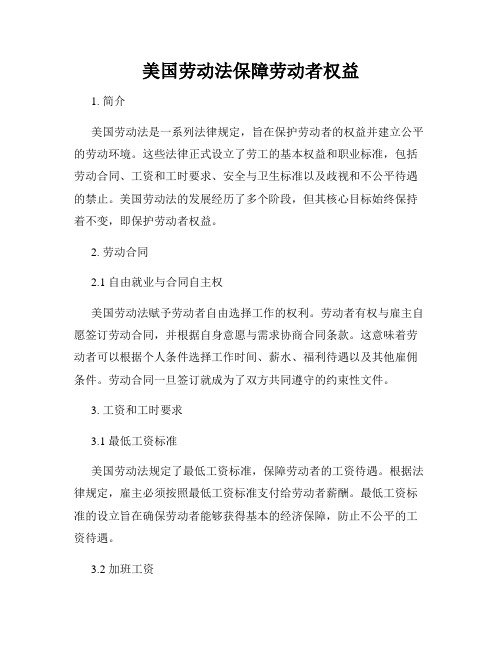
美国劳动法保障劳动者权益1. 简介美国劳动法是一系列法律规定,旨在保护劳动者的权益并建立公平的劳动环境。
这些法律正式设立了劳工的基本权益和职业标准,包括劳动合同、工资和工时要求、安全与卫生标准以及歧视和不公平待遇的禁止。
美国劳动法的发展经历了多个阶段,但其核心目标始终保持着不变,即保护劳动者权益。
2. 劳动合同2.1 自由就业与合同自主权美国劳动法赋予劳动者自由选择工作的权利。
劳动者有权与雇主自愿签订劳动合同,并根据自身意愿与需求协商合同条款。
这意味着劳动者可以根据个人条件选择工作时间、薪水、福利待遇以及其他雇佣条件。
劳动合同一旦签订就成为了双方共同遵守的约束性文件。
3. 工资和工时要求3.1 最低工资标准美国劳动法规定了最低工资标准,保障劳动者的工资待遇。
根据法律规定,雇主必须按照最低工资标准支付给劳动者薪酬。
最低工资标准的设立旨在确保劳动者能够获得基本的经济保障,防止不公平的工资待遇。
3.2 加班工资美国劳动法还规定了加班工资的支付要求。
劳动者在完成正常工作时间后所提供的额外工作时间,应按照法定加班工资标准得到报酬。
这项措施旨在保护劳动者的劳动权益,防止过度加班和不合理的工时安排。
4. 安全与卫生标准美国劳动法通过制定一系列安全与卫生标准来保护劳动者的生命和身体健康。
这些标准规定了雇主在工作场所必须提供的安全设施和防护装备,以及应采取的安全措施。
此外,法律还要求雇主为劳动者提供与工作环境相关的适当培训和教育。
5. 歧视和不公平待遇的禁止美国劳动法禁止任何形式的歧视和不公平待遇。
劳动者在雇佣过程以及工作中,不应因为种族、性别、年龄、宗教、国籍等个人特征而受到不公平的对待。
此外,劳动法还保护妇女、残疾人、老年人和其他弱势群体的权益,禁止针对这些群体的歧视和不平等待遇。
结论美国劳动法通过一系列法律规定,有效保障了劳动者的权益。
劳动合同、工资和工时要求、安全与卫生标准以及禁止歧视等方面的规定确保了劳动者在工作中获得公正对待。
美国劳动法与劳动关系解析
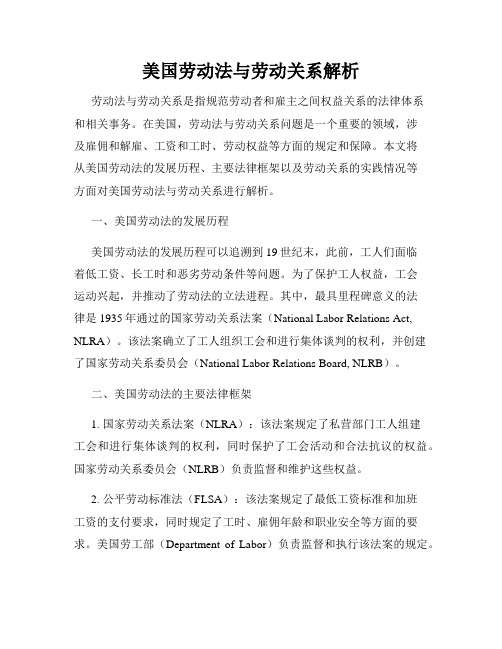
美国劳动法与劳动关系解析劳动法与劳动关系是指规范劳动者和雇主之间权益关系的法律体系和相关事务。
在美国,劳动法与劳动关系问题是一个重要的领域,涉及雇佣和解雇、工资和工时、劳动权益等方面的规定和保障。
本文将从美国劳动法的发展历程、主要法律框架以及劳动关系的实践情况等方面对美国劳动法与劳动关系进行解析。
一、美国劳动法的发展历程美国劳动法的发展历程可以追溯到19世纪末,此前,工人们面临着低工资、长工时和恶劣劳动条件等问题。
为了保护工人权益,工会运动兴起,并推动了劳动法的立法进程。
其中,最具里程碑意义的法律是1935年通过的国家劳动关系法案(National Labor Relations Act, NLRA)。
该法案确立了工人组织工会和进行集体谈判的权利,并创建了国家劳动关系委员会(National Labor Relations Board, NLRB)。
二、美国劳动法的主要法律框架1. 国家劳动关系法案(NLRA):该法案规定了私营部门工人组建工会和进行集体谈判的权利,同时保护了工会活动和合法抗议的权益。
国家劳动关系委员会(NLRB)负责监督和维护这些权益。
2. 公平劳动标准法(FLSA):该法案规定了最低工资标准和加班工资的支付要求,同时规定了工时、雇佣年龄和职业安全等方面的要求。
美国劳工部(Department of Labor)负责监督和执行该法案的规定。
3. 职业安全与健康法案(OSHA):该法案确立了保护员工免受安全和健康危害的权利,并要求雇主提供安全工作环境和培训。
美国劳工部的职业安全与健康管理局(OSHA)负责执行该法案。
4. 就业歧视法案:包括《平等工资法案》(Equal Pay Act)、《民权法案》(Civil Rights Act)和《美国残疾人法案》(Americans with Disabilities Act)等,这些法案禁止雇主因性别、肤色、宗教、残疾和年龄等原因进行就业歧视。
美国加班加点的法律规定(3篇)

第1篇在美国,加班加点是职场中常见的现象。
然而,对于加班加点,美国有严格的法律规定来保障劳动者的权益。
以下是对美国加班加点的法律规定的详细介绍。
一、联邦层面的法律规定1. 《公平劳动标准法》(Fair Labor Standards Act,简称FLSA)《公平劳动标准法》是美国联邦政府制定的关于劳动标准的基本法律,旨在保护劳动者的权益,确保公平的工资和工时制度。
以下是FLSA关于加班加点的相关规定:(1)适用范围:FLSA适用于所有在美国从事商业或工业活动的雇主,以及这些雇主雇佣的绝大多数员工。
(2)加班工资:根据FLSA规定,非豁免员工在正常工作时间之外工作,应当获得加班工资。
正常工作时间是指每周40小时以内的工作时间。
加班工资通常是正常工资的1.5倍。
(3)加班工资计算:加班工资的计算方法有两种,一种是按小时计算,另一种是按周计算。
按小时计算时,将加班时间乘以正常工资率;按周计算时,将加班时间乘以正常工资率,然后除以正常工作时间。
2. 《加班工资公平法》(Overtime Fairness Act)《加班工资公平法》是2016年美国国会通过的一项法案,旨在调整FLSA中关于豁免员工的规定。
该法案的主要内容包括:(1)扩大豁免员工的范围:将某些豁免员工从专业、行政和执行职位调整为只适用于专业职位。
(2)提高豁免员工的工资标准:将豁免员工的最低年薪标准从每年91360美元提高到137,000美元。
二、州层面的法律规定美国各州都有自己的劳动法规定,其中部分州对加班加点有更为严格的要求。
以下是一些州关于加班加点的法律规定:1. 加州:加州《工资法》规定,非豁免员工在正常工作时间之外工作,应当获得加班工资。
加班工资的计算方法与FLSA相同。
2. 纽约州:纽约州《工资法》规定,非豁免员工在正常工作时间之外工作,应当获得加班工资。
加班工资的计算方法与FLSA相同。
3. 佛罗里达州:佛罗里达州《工资法》规定,非豁免员工在正常工作时间之外工作,应当获得加班工资。
美国劳动法工作场所的权益与义务
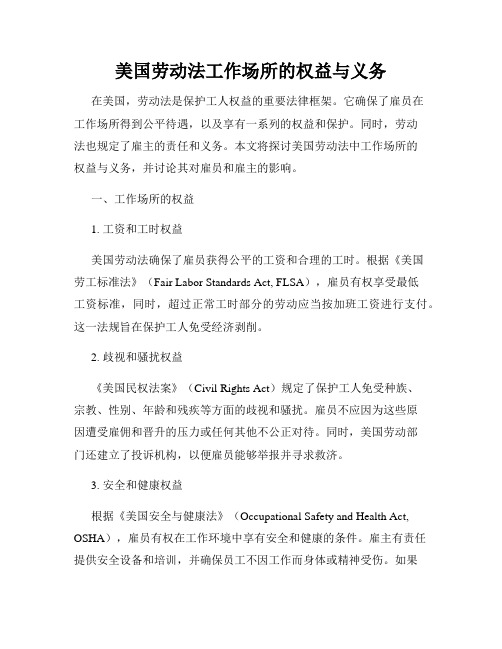
美国劳动法工作场所的权益与义务在美国,劳动法是保护工人权益的重要法律框架。
它确保了雇员在工作场所得到公平待遇,以及享有一系列的权益和保护。
同时,劳动法也规定了雇主的责任和义务。
本文将探讨美国劳动法中工作场所的权益与义务,并讨论其对雇员和雇主的影响。
一、工作场所的权益1. 工资和工时权益美国劳动法确保了雇员获得公平的工资和合理的工时。
根据《美国劳工标准法》(Fair Labor Standards Act, FLSA),雇员有权享受最低工资标准,同时,超过正常工时部分的劳动应当按加班工资进行支付。
这一法规旨在保护工人免受经济剥削。
2. 歧视和骚扰权益《美国民权法案》(Civil Rights Act)规定了保护工人免受种族、宗教、性别、年龄和残疾等方面的歧视和骚扰。
雇员不应因为这些原因遭受雇佣和晋升的压力或任何其他不公正对待。
同时,美国劳动部门还建立了投诉机构,以便雇员能够举报并寻求救济。
3. 安全和健康权益根据《美国安全与健康法》(Occupational Safety and Health Act, OSHA),雇员有权在工作环境中享有安全和健康的条件。
雇主有责任提供安全设备和培训,并确保员工不因工作而身体或精神受伤。
如果发生工作场所伤害或职业病,雇主应及时采取措施并赔偿相关医疗费用。
二、工作场所的义务1. 工资支付义务根据美国劳动法,雇主必须及时支付雇员的工资。
工资支付应按照约定的方式和时间进行,而不能任意拖延或以其他形式拒付工资。
如果雇主违反工资支付义务,雇员有权向劳动局投诉,并可能获得补偿。
2. 公平雇佣义务雇主不能在雇佣过程中进行种族、宗教、性别、年龄和残疾等方面的歧视。
他们有责任在招募和录用人员的过程中遵守公平原则,并提供平等的机会。
此外,雇主还有义务向符合条件的残疾人提供合理的工作适应性设施。
3. 安全措施义务根据美国安全与健康法,雇主有责任提供安全设备和培训,确保工作环境安全。
雇主还应向雇员提供必要的工作健康保护措施,并遵守相关的安全标准。
美国劳动法解除劳动合同赔偿标准

美国劳动法解除劳动合同赔偿标准下载温馨提示:该文档是我店铺精心编制而成,希望大家下载以后,能够帮助大家解决实际的问题。
本文下载后可定制随意修改,请根据实际需要进行相应的调整和使用,谢谢!并且,本店铺为大家提供各种各样类型的实用资料,如教育随笔、日记赏析、句子摘抄、古诗大全、经典美文、话题作文、工作总结、词语解析、文案摘录、其他资料等等,如想了解不同资料格式和写法,敬请关注!Downloaded tips: This document is carefully compiled by the editor. I hope that after you download them, they can help you solve practical problems. The documents can be customized and modified after downloading, please adjust and use it according to actual needs, thank you!In addition, our shop provides you with various types of practical materials, such as educational essays, diary appreciation, sentence excerpts, ancient poems, classic articles, topic composition, work summary, word parsing, copy excerpts, other materials and so on, want to know different data formats and writing methods, please pay attention!在美国,解除劳动合同是一项敏感而复杂的法律程序,受到严格的监管和规范。
- 1、下载文档前请自行甄别文档内容的完整性,平台不提供额外的编辑、内容补充、找答案等附加服务。
- 2、"仅部分预览"的文档,不可在线预览部分如存在完整性等问题,可反馈申请退款(可完整预览的文档不适用该条件!)。
- 3、如文档侵犯您的权益,请联系客服反馈,我们会尽快为您处理(人工客服工作时间:9:00-18:30)。
United States labor lawlocal governments, where workers derive their rights from state law. Federal and statethat would bar employers from discriminating against employees to prevent them fromContents[hide]• 1 History• 2 Contract and rights at worko 2.1 Contract of employmento 2.2 Scope of protectiono 2.3 Wages regulationo 2.4 Pensionso 2.5 Health and safetyo 2.6 Child care rightso 2.7 Income taxo 2.8 Civil liberties• 3 Workplace participationo 3.1 Trade unionso 3.2 Right to organizeo 3.3 Collective bargainingo 3.4 Collective action• 4 Equality and discriminationo 4.1 Civil rightso 4.2 Justificationso 4.3 Affirmative actiono 4.4 Free movement and immigration• 5 Job securityo 5.1 Dismissal protectionso 5.2 Redundancieso 5.3 Unemployment• 6 Labor law in individual stateso 6.1 Laws restricting unionso 6.2 California•7 Enforcement of rights•8 See also•9 Notes•10 References•11 External linksHistory[edit]Main articles: History of labor law in the United States and Labor history of the United StatesA man building the frame of the Empire State Building at the start of the Great Depression in 1930.[2]•Indentured servant•Commonwealth v. Pullis (1806), establishing that unions were criminal conspiracies in the Philadelphia Mayor's court•Commonwealth v. Hunt (1842), disapproving Pullis in the Massachusetts Supreme Judicial Court, and establishing that unions were not necessarily criminal •Vegelahn v. Guntner, 167 Mass. 92 (1896)•Sherman Antitrust Act•Lochner v. New York, 198 US45 (1905)•Loewe v. Lawlor208 U.S. 274 (1908) or The Danbury Hatters' case•Adair v. United States, 208 U.S. 161 (1908) upholding yellow dog contracts, banned by The Erdman Act of 1898 section 10 on the railroads, until reversed bythe Norris-LaGuardia Act•Commission on Industrial Relations (1915)•Adkins v. Children's Hospital, 261 U.S. 525 (1923) Supreme Court held a minimum wage for women and children in DC was unconstitutionalIn 1941, Executive Order 8802 (or the Fair Employment Act) became the first law toprohibit racial discrimination, although it only applied to the national defense industry.Later laws include Title VII of the Civil Rights Act of 1964 (and amendments), Title I of the Americans with Disabilities Act of 1990,[3] the Family and Medical Leave Act of1993,[4] and numerous state laws with additional protections. The Fair Labor Standards Act[5] regulates minimum wages and overtime pay for certain employees who work more than 40 hours in a work week.While working an employee must work a minimum of two hours in a day. Cases of employment discrimination in the United States are most often subject to the jurisdiction of the Equal Employment Opportunity Commission, the federal commission responsible for the enforcement of the anti-discrimination laws. Once a case has been filed with the EEOC or similar state agencies with concurrent jurisdiction, employees have a right to remove the case to the courts with the permission of the agency, or in some instances, after the expiration of a set time period. Employment law cases are heard in state or federal courts, depending upon the issue, the size of the employer (the Civil Rights Act of 1964,[6] for example, applies only to employers with 15 or more employees), and the litigation strategy of the plaintiff.Contract of employment[edit]See also: United States contract lawScope of protection[edit]•Dunlop Commission on the Future of Worker-Management Relations: Final Report (1994) recommended a unified definition of an employee under all labor laws •Inequality of bargaining power•United States v. Silk, 331 U.S. 704 (1947)•NLRB v. Hearst Pub's, Inc 322 U.S. 111 (1944) an employee under the National Labor Relations Act•Nationwide Mut. Ins. Co. v. Darden, 503 U.S. 318 (1992) employee under ERISA •Clackamas Gastroenterology Assocs. v. Wells, 538 U.S. 440 (2003) employee definition under the Americans with Disabilities Act•Lemmerman v. A.T. Williams Oil Co., 350 S.E.2d 83 (1986) under the North Carolina Workers' Compensation Act an eight year old boy was considered anemployee, although employing children under the age of 8 was unlawful.•Castillo v. Case Farms of Ohio, 96 F Supp. 2d 578 (1999) that an employer who used an employment agency called "American Temp Corps", was responsible for the way that hired migrant farm workers in T exas to work in an Ohio chicken factory, being packed into sub-human transport and living conditions in violation of the Migrant and Seasonal Agricultural Workers Protection Act 1983•Christopher v. SmithKline Beecham Corp., 567 U.S. ___ (2012) 5 to 4, a travelling salesman of four years for GSK was classified as an outside salesman, and so could notWages regulation[edit]Main articles: Fair Labor Standards Act and Minimum wage in the United StatesA graph of the changes in the federal minimum wage rate. Light blue is the real wage and dark blue the nominal wageThe Fair Labor Standards Act[7] of 1938 (FLSA) establishes minimum wage and overtime rights for most private sector workers, with a number of exemptions and exceptions. Congress amended the Act in 1974 to cover governmental employees, leading to a series of United States Supreme Court decisions in which the Court first held that the law was unconstitutional, then reversed itself to permit the FLSA to cover governmental employees.The FLSA does not preempt state and local governments from providing greater protections under their own laws. A number of states have enacted higher minimum wages and extended their laws to cover workers who are excluded under the FLSA or to provide rights that federal law ignores.Local governments have also adopted a number of "living wage" laws that require those employers that contract with them to pay higher minimum wages and benefits to their employees. The federal government, along with many state governments, likewise require employers to pay the prevailing wage, which typically reflects the standards established by unions' collective bargaining agreements in the area, to workers on public works projects.•Tennessee Coal, Iron & Railroad Co. v. Muscoda Local No. 123, 321 U.S. 590 (1944) travel to work, once underground, was working time under the FLSA. •Jewell Ridge Coal Corp. v. United Mine Workers of America, 325 U.S. 161 (1945) time traveling to work through the coal mine did count as working because it (1)required physical and mental exertion that was (2) controlled and required by the employer (3) for the employer's benefit.•Anderson v. Mt. Clemens Pottery Co., 328 U.S. 680 (1946) 5 to 2, that preparatory activities at work for the employer's benefit (such as setting up at one's work station) count as working time for FLSA §§7(a) and 11(c).•Skidmore v. Swift & Co., 323 U.S. 134 (1944) the Department of Labor's recommendations over what counted as overtime would be given a level of deference commensurate to its persuasiveness, the thoroughness of investigation, itsconsistency, and the validity of its reasoning.•Auer v. Robbins, 519 U.S. 452 (1997) police sergeants and lieutenants were classed as executives or professional employees, and therefore could not claimovertime pay under the FLSA.•Christensen v. Harris County, 529 U.S. 576 (2000) an employer could require police employees to use up their "comp" time before claiming extra overtime pay. The Department of Labor's recommendation that this violated the FLSA was not binding.•National League of Cities v. Usery, 426 U.S. 833 (1976) 5 to 4 decision that the FLSA could not be extended to state government employees, reversed by Garcia. •Garcia v. San Antonio Metropolitan Transit Authority, 469 U.S. 528 (1985) 5 to 4, there was authority under the FLSA consistent with the Tenth Amendment to extend the Act's protection to public transport employees.Pensions[edit]Main article: Pensions in the United StatesThe Employee Retirement Income Security Act[8] establishes standards for the funding and operation of pension and health care plans provided by employers to their employees. The ERISA preempts most state legislation that attempts to regulate how such plans are administered and, to a great extent, what types of health care coverage they provide. ERISA also preempts state law claims that an employer discriminated against employees in order to prevent them from obtaining the benefits they would have earned otherwise or to retaliate against them for asserting their rights.•Internal Revenue Code401(k)•Taft-Hartley plan•Employee Retirement Income Security Act of 1974•Pension Benefit Guaranty Corporation•Voluntary Employee Beneficiary AssociationHealth and safety[edit]Main article: Occupational Safety and Health Act 1970The Occupational Safety and Health Act,[9] signed into law in 1970 by President Richard Nixon, creates specific standards for workplace safety. The Act has spawned years of litigation by industry groups that have challenged the standards limiting the amount of permitted exposure to chemicals such as benzene. The Act also provides for protection for "whistleblowers" who complain to governmental authorities about unsafe conditions while allowing workers the right to refuse to work under unsafe conditions in certain circumstances. The Act allows states to take over the administration of OSHA in their jurisdictions, so long as they adopt state laws at least as protective of workers' rights as under federal law. More than half of the states have done so.The Family and Medical Leave Act,[10] passed in 1993, requires employers to provide workers with twelve weeks of unpaid medical leave and continuing medical benefit coverage in order to attend to certain medical conditions of close relatives or themselves. Many states have comparable statutory provisions; some states have offered greater protections.Child care rights[edit]•Child labor laws in the United States•Family and Medical Leave Act of 1993•Maternity leave in the United States•Work-family balance in the United States•Work–life balance (United States)•Parental leave•Government Day Care in the United StatesIncome tax[edit]Main article: Income tax in the United States•Income tax in the United StatesCivil liberties[edit]•Pickering v. Board of Education, 391 U.S. 563 (1968) 8 to 1, a public school teacher was dismissed for writing a letter to a newspaper that criticised the way the school board was raising money. This violated the First Amendment andthe Fourteenth Amendment•Connick v. Myers, 461 U.S. 138 (1983) 5 to 4, a public attorney employee was not unlawfully dismissed after distributing a questionnaire to other staff on a supervisor's management practices after she was transferred under protest. In dissent, Brennan J held that all the matters were of public concern and should therefore be protected by the First Amendment•Rankin v. McPherson, 483 U.S. 378 (1987) 5 to 4, a Texas deputy constable had a First Amendment right to say, after the assassination attempt on RonaldReagan "Shoot, if they go for him again, I hope they get him." Dismissal was unlawful and she had to be reinstated because even extreme comments (except potentially advocating actual murder) against a political figure should be protected. She could not be fired for merely exercising a right in the Constitution.•Waters v. Churchill, 511 U.S. 661 (1994) 7 to 2, a public hospital nurse stating, outside work at dinner, that the cross-checking policies of the hospital were flawed, could be dismissed without any violation of the First Amendment because it could be seen as interfering with the employer's operations•Garcetti v. Ceballos, 547 U.S. 410 (2006) 5 to 4, no right against dismissal or protected speech when the speech relates to a matter in one's profession•Whistleblower Protection Act of 1989•Huffman v. Office of Personnel Management, 263 F.3d 1341 (Fed. Cir. 2001)•O'Connor v. Ortega, 480 U.S. 709 (1987) searches in the workplace•Ontario v. Quon, 130 S.Ct. 2619, (2010) the right of privacy did not extend to employer owned electronic devices so an employee could be dismissed for sending sexually explicit messages from an employer owned pager.Workplace participation[edit]President Franklin D. RooseveltContrary to popular intent, the Sherman Antitrust Act (1890) led to prosecution of unions as illegal combinations, but Section 6 of the Clayton Antitrust Act (1914) ended this practice by stipulating that unions shall not be "construed to be illegal combinations or conspiracies in restraint of trade, under the antitrust laws." The National Labor Relations Act gave a general right to organize in a trade union and collectively bargain.The Taft-Hartley Act (also the "Labor-Management Relations Act"), passed in 1947, loosened some of the restrictions on employers, changed NLRB election procedures, and added a number of new limitations on unions. The Act, among other things, prohibits jurisdictional strikes and secondary boycotts by unions, and authorizes individual states to pass "right-to-work laws", regulates pension and other benefit plans established by unions and provides that federal courts have jurisdiction to enforce collective bargaining agreements.The United States Congress has not yet ratified the International LabourOrganization Convention on the Freedom of Association and Protection of the Right to Organise Convention, 1948 or the Right to Organise and Collective Bargaining Convention, 1949.•Commission on Industrial Relations (1912-1915)•Workplace democracy, Industrial democracy, Economic democracyThe United States Congress subsequently tightened those restrictions on unions inthe Labor Management Reporting and Disclosure Act of 1959, which also regulates the internal affairs of all private sector unions, providing for minimum standards for unions' internal disciplinary proceedings, federal oversight for unions' elections of their own officers, and fiduciary standards for union officers' use of union funds.Union members' participation rights•American Civil Liberties Union, Democracy in Trade Unions (1943)•United States Senate Select Committee on Improper Activities in Labor and Management (1957-1960)•Labor Management Reporting and Disclosure Act 1959 §§•Trbovich v. United Mine Workers, 404 U.S. 528 (1972) upheld the right of union members to intervene in enforcement proceedings brought by the United StatesDepartment of Labor•Hall v. Cole, 412 U.S. 1 (1973), in which the Supreme Court interpreted the Landrum-Griffin Act to permit the awarding of attorney's fees to successful plaintiffs.•Dunlop v. Bachowski, 421 U.S. 560 (1975) upheld the authority of federal courts to review the Department of Labor's decision to proceed or not proceed withprosecutions under Landrum-GriffinRestrictions on membership•De Veau v. Braisted, 363 U.S. 144 (1960) 5 to 3, that it was consistent with the NLRA 1935 that state law could bar union officials from holding office if they had been convicted of a felony. The dissenting judges argued that state law couldintroduce no additional requirement to those in the statute.•Brown v. Hotel and Restaurant Employees, 468 US491 (1984) 4 to 3, New Jersey could impose a requirement that all union officials in a casino had no association with organized crime, consistently with NLRA 1935 §7. The dissenting judgment argued that the requirement was disproportionate because it applied penalties to the whole union rather than the officialsUnion fees•Taft-Hartley Act 1947 §14(b) confirmed states rights to pass "right to work laws", so that a union cannot sign a collective agreement to register all workers as union members, or collect fees for the service of collective bargaining.•Lincoln Fed Labor Union 19129 v. Northwestern Iron & Metal Co, 335 US525 (1949)•Machinists v. Street, 367 US740 (1961), states that "a union may constitutionally compel contributions from dissenting nonmembers in an agency shop only for the costs of performing the union's statutory duties as exclusive bargaining agent." •Communications Workers of America v. Beck, 487 US735 (1988) 5 to 3 that unions could have an agreement with employers that fees be collected to pay for the union's activities, but only up to the point that it was necessary to cover its costs. •Locke v. Karass, 129 S. Ct. 798 (2008) legitimate costs could include the Maine State Employees Association's costs for in national arbitration litigation.Political contributions•United States v. Congress of Industrial Organizations, 335 U.S. 106 (1948) there was no violation of the Federal Corrupt Practices Act 1910in a union publiclyadvocating for particular Congress members to be elected•Abood v Detroit School Board, 431 US 209 (1977) consistent with freedom of association, unions can be required to allow members to contract out of the political activity levies of the union.•Lehnert v. Ferris Faculty Association, 500 U.S. 507 (1991) 5 to 4, the union can require nonmembers to give service fee contributions only for its activities as anexclusive bargaining agent, and not for political activities.•Davenport v. Washington Education Association, 551 U.S. 177 (2007) state legislation could require, consistently with the First Amendment, that a union member opts into the fund for political expenditureThe National Labor Relations Act (NLRA, the "Wagner Act") gives private sector workers the right to choose whether they wish to be represented by a union and establishesthe National Labor Relations Board (NLRB) to hold elections for that purpose. As originally enacted in 1935, the NLRA makes it illegal for employers to discriminate against workers because of their union membership or retaliate against them for engaging in organizing campaigns or other "concerted activities", to form "company unions", or to refuse to engage in collective bargaining with the union that represents their employees. The NLRA does not cover governmental employees, with the exception of employees of the United States Postal Service, a quasi-public entity. The Federal Labor Relations Act provides for much more limited rights for employees of the federal government. Congress has excluded workers in the United States Department of Homeland Security and elsewhere from even these limited protections. In order to keep up with the most recent versions to be in compliance with federal labor law, employees could get more detailed information by reading the federal labor law poster, which is required to be posted in the company.Federal law does not provide employees of state and local governments with the right to organize or engage in union activities, except to the extent that the United States Constitution protects their rights to freedom of speech and freedom of association. The Constitution provides even less protection for governmental employees' right to engage in collective bargaining: while it bars public employers from retaliating against employees for forming a union, it does not require those employers to recognize that union, much less bargain with it. Most states provide public employees with limited statutory protections; a few permit public employees to strike in support of their demands in some circumstances. Some states, however, particularly in the South, make it illegal for a governmental entity to enter into a collective bargaining agreement with a union.The NLRA does not cover agricultural or domestic employees. A few states have enacted labor laws similar to the NLRA covering farm workers. Finally, the NLRA does not cover employees in the railroad and airline industries. Those workers are covered bythe Railway Labor Act, first passed in 1926, then amended in 1936 to cover airlineemployees. The RLA creates a wholly different structure for resolving labor disputes, requiring bargaining under indirect governmental supervision and permitting strikes only in limited circumstances.Freedom of association•Hague v. Committee for Industrial Organization, 307 U.S. 496 (1939) held to be a violation of the First Amendment for the NJ mayor to shut down trade union CIOmeetings because he thought they were "communist"•National Labor Relations Act 1935 §7, "Employees shall have the right to self-organization, to form, join, or assist labor organizations, to bargain collectively through representatives of their own choosing, and to engage in other concertedactivities for the purpose of collective bargaining or other mutual aid or protection." Right to communicate to colleagues•National Labor Relations Act 1935 §§7-8•Lechmere, Inc. v. National Labor Relations Board, 502 U.S. 527 (1992) 6 to 3, held that an employer did not commit an unfair labor practice under NLRA 1935 §7 by preventing union members, who were not employees of Lechmere Inc, from entering the company parking lot to hand out leaflets. They could not order union members to leave the public grassy area outside the employer's property.Right to suffer no detriment for being in a union•Hoffman Plastic Compounds, Inc. v. National Labor Relations Board, 535 U.S. 137 (2002) 5 to 4, the right to not suffer detriment for union organizing activitiesunder NLRA 1935 §8(a)(3) did not apply for an illegal immigrant. This meant theemployer did not need to give substantial back pay for firing a worker after he handed out fliers for the AFL union.•NLRB v. J. Weingarten, Inc., 420 U.S. 251 (1975) a trade union member has the right to a union representative in any disciplinary inquiry by the managementCollective bargaining[edit]"Employees shall have the right to self-organization, to form, join, or assist labor organizations, to bargain collectively through representatives of their own choosing, and to engage in other concerted activities for the purpose of collective bargaining or other mutual aid or protection, and shall also have the right to refrain from any or all of such activities except to the extent that such right may be affected by an agreement requiring membership in a labor organization as a condition of employment as authorized in section 158 (a)(3) of this title."Wagner Act 1935 §7 Main articles: Collective bargaining, National Labor Relations Act and Taft-Hartley ActCongress has since expanded the NLRB's jurisdiction to health care institutions, with unique rules governing organizing and strikes against those employers.For the most part the NLRA and RLA displace state laws that attempt to regulate the right to organize, to strike and to engage in collective bargaining. The NLRB has exclusive jurisdiction to determine whether an employer has engaged in an unfair labor practice and to decide what remedies should be provided. States and local governments can, on the other hand, impose requirements when acting as market participants, such as requiring that all contractors sign a project labor agreement to avoid strikes when building a public works project, that they could not if they were attempting to regulate those employers' labor relations directly.•National Labor Relations Board v. Sands Manufacturing Co., 306 U.S. 332 (1939)5 to 2, for collective bargaining to be taking place under the NLRA 1935 there must bescheduled meetings between the union and the employer, but if there were none, the employer could not be considered to violate its duties by shutting down a factory. It held the NLRB's charges were not supported by evidence.•National Labor Relations Board v. Columbian Enameling & Stamping Co., 306 U.S.292 (1939) 5 to 2, held the NLRB had not produced the requisite "substantialevidence" that an employer had acted unlawfully and in directing employment toresume and a lockout to end. The NLRB had attempted to negotiate with an employer on a union's behalf during a lockout.•Wallace Corporation v. National Labor Relations Board, 323 U.S. 248 (1944) it was an unfair labor practice to recognize a company union and have a closedshop agreement with it, so excluding workers who wished to join the independent union.•Marquez v. Screen Actors Guild Inc., 525 U.S. 33 (1998) duty of fair representation•Federal Labor Relations Act 1978•Railway Labor Act 1926, for rail and airline workersCollective action[edit]"Nothing in this subchapter, except as specifically provided for herein, shall be construed so as either to interfere with or impede or diminish in any way the right to strike, or to affect the limitations or qualifications on that right."Wagner Act 1935 §13 Main articles: Strike action and Collective actionMembers of the Writers' Guild of America on strike against deteriorating terms and conditions in their employment agreements in 2007The Norris-LaGuardia Act of 1932 outlawed the issuance of injunctions in labor disputes by federal courts. While the Act does not prevent state courts from issuing injunctions, it ended what some observers called "government by injunction", in which the federal courts used injunctions to prevent unions from striking, organizing and, in some cases, even talking to workers or entering certain parts of a state. Roughly half the states have enacted their own version of the Norris-LaGuardia Act.•Protected concerted activity•New Negro Alliance v. Sanitary Grocery Co., 303 U.S. 552 (1938)•NLRB v. Mackay Radio & Telegraph Co. 304 U.S. 333 (1938), that striking workers remain "employees"•United States v. Congress of Industrial Organizations, 335 U.S. 106 (1948), holding that unions advocating members vote for particular Congress candidates did not violate the Federal Corrupt Practices Act as amended by the Labor Management Relations Act•NLRB v. Mackay Radio & Telegraph Co. 304 U.S. 333 (1938) striking workers remain as employees while on strike, and so it is an unfair labor practice under NLRA 1935 §7 to discriminate in reinstating the workers. However, it was not unfair to hire new workers to break the strike, or to not discharge the strike breakers in order to reinstate the former workers•National Labor Relations Board v. Fansteel Metallurgical Corporation, 306 U.S.240 (1939) employees who took part in an unlawful sit down strike, after the employer had attempted to set up a company union, were not entitled to reinstatement in their jobs. Engaging in an unlawful strike meant losing the protection of the NLRA 1935.•NLRB v. Truck Drivers Local 449, 353 U.S. 87 (1957) temporary lockout held to be lawful•Thornhill v. Alabama, 310 U.S. 88 (1940) picketing could not be restricted by state law, as that would violate the First Amendment and the Fourteenth Amendment, so long as the picket was related to a labor dispute in issue.Equality and discrimination[edit]See also: Employment discrimination law in the United States and Civil Rights Act 1964President Lyndon B. Johnson speaks to a television camera at the signing of the Civil Rights Act of 1964. Civil rights[edit]While Congress passed laws barring racial discrimination by private employers in 1866 with the Civil Rights Act of 1866,[11] the Supreme Court's decision in the Civil Rights Cases made that Act a dead letter for nearly a century. Congress adopted limited prohibitions against racial discrimination by defense contractors during World War II, but no general prohibition against employment discrimination until it passed Title VII ofthe Civil Rights Act of 1964,[12] which bars employment discrimination on the basis of race, gender, national origin and religion.Congress amended that Act in 1972 to cover governmental employers, in 1981 to outlaw employment discrimination on the basis of pregnancy, and again in the Civil Rights Act of 1991 to overturn a number of decisions by the Supreme Court limiting employees' rights.Congress has also protected the rights of workers over forty years of age in the Age Discrimination in Employment Act, passed in 1967, and the Americans with Disabilities Act[13] of 1990. The Immigration Reform and Control Act of 1986 also provides narrow prohibitions against certain types of employment discrimination based on immigration status.Title VII[14] encourages states to pass their own anti-discrimination laws; most states outside the South have done so. A number of states and local governments have also enacted statutes that expand on the rights that federal law offers, either by offering greater remedies or broader protections, or have legislated in areas that federal law does not cover, such as discrimination based on sexual orientation or marital status.。
